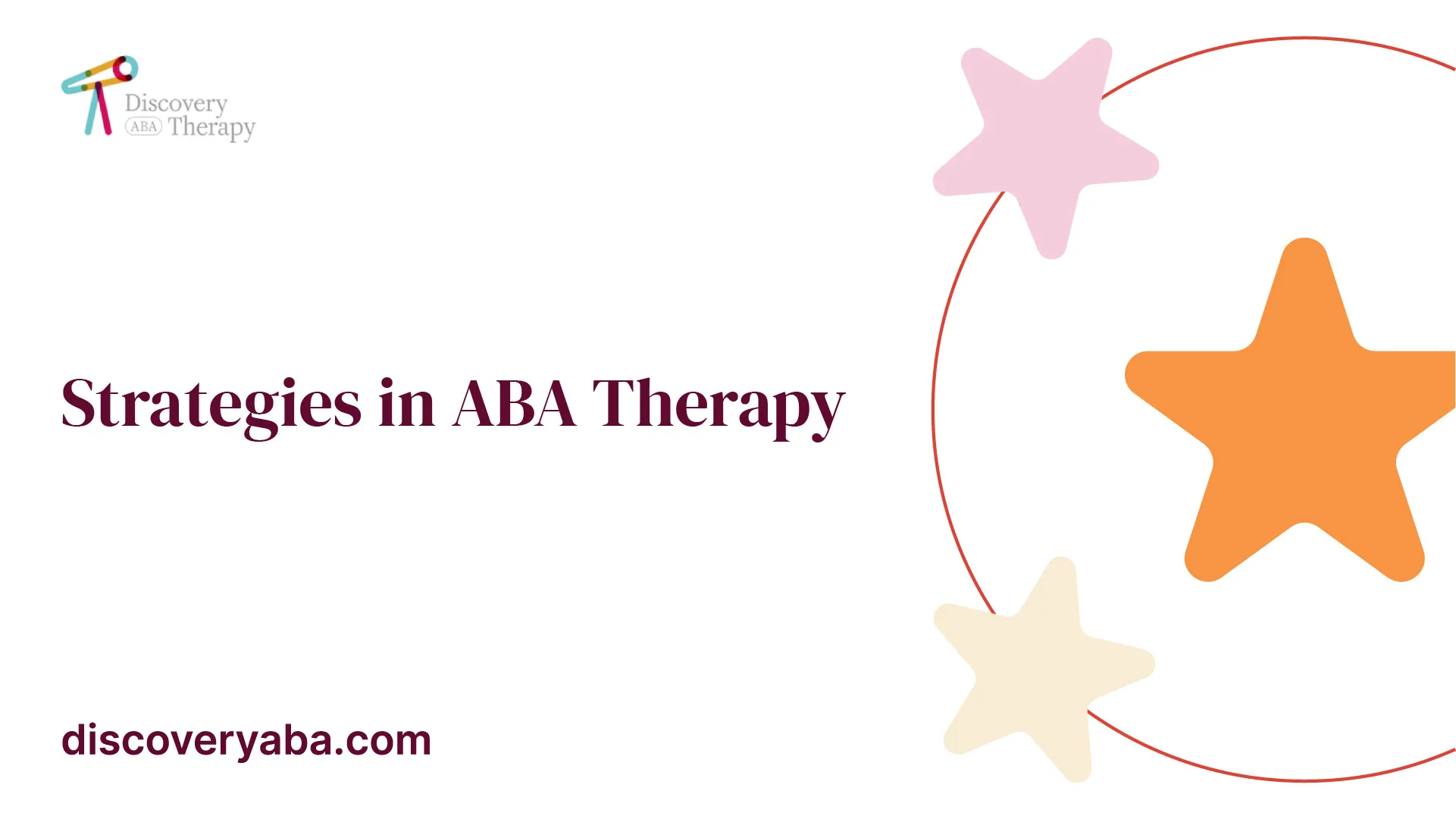The Power of Applied Behavior Strategies
Unlock the power of applied behavior strategies! Discover the effectiveness and ethical considerations of ABA therapy.


Understanding ABA Therapy
Applied Behavior Analysis (ABA) is an evidence-based practice that focuses on understanding and modifying behavior to improve socially significant behaviors, such as communication skills, social skills, and daily living skills. ABA therapy is widely recognized as a gold standard in behavior modification and has been used to help children with autism and related developmental disorders since the 1960s.
Key Components of ABA
ABA therapy utilizes various techniques and strategies to analyze and modify behavior. The key components of ABA include:
- Observation and Data Collection: ABA therapists carefully observe and collect data on behavior patterns to identify the target behaviors that need to be addressed. This data-driven approach allows for objective analysis and measurement of progress.
- Antecedent-Behavior-Consequence (ABC) Analysis: A comprehensive ABA plan needs to address all the component areas: antecedent, behavior, and consequence [2]. This analysis involves identifying the antecedents (events or stimuli that precede the behavior), the behavior itself, and the consequences (events or stimuli that follow the behavior). By understanding these factors, ABA therapists can develop effective intervention strategies.
- Functional Behavior Assessment (FBA): FBA is a process used to identify the underlying functions or reasons behind a specific behavior. It involves analyzing the events, triggers, and consequences associated with the behavior to better understand its purpose. This assessment helps in creating individualized treatment plans.
Importance of ABA for Children
ABA therapy plays a crucial role in supporting the development and well-being of children. It is used to help children improve various skills, including social skills, communication patterns, fine motor skills, grooming, academic skills, job proficiency, and maintaining a clean and organized environment [3].
ABA therapy is considered an evidence-based best practice treatment by the US Surgeon General and the American Psychological Association. Numerous studies have shown that intensive and long-term therapy using ABA principles can improve outcomes for many children with autism in areas such as intellectual functioning, language development, daily living skills, and social functioning. Early intervention using ABA techniques has been found to be particularly beneficial for children with autism, as it can lead to better long-term outcomes.
By employing the key components of ABA and recognizing the importance of ABA therapy for children, therapists and caregivers can provide effective support and interventions to help children reach their full potential. The next section will delve into specific strategies used in ABA therapy, such as Discrete Trial Training, Antecedent-based Interventions, and Functional Behavior Assessment.
Strategies in ABA Therapy

Applied Behavior Analysis (ABA) therapy utilizes various strategies to promote positive behavior change and skill development. In this section, we will explore three key strategies commonly employed in ABA therapy: Discrete Trial Training (DTT), Antecedent-based Interventions (ABI), and Functional Behavior Assessment (FBA).
Discrete Trial Training (DTT)
Discrete Trial Training (DTT) is a foundational teaching strategy in ABA therapy. It involves breaking down skills into small, distinct elements and presenting them in a structured and systematic manner. Each trial consists of three components: the antecedent, the behavior, and the consequence. The learner is prompted to respond, and positive reinforcement is provided after each correct response [3].
DTT is particularly effective when teaching early learning skills such as receptive instructions or imitation. It is also beneficial for learners who require skills to be broken down into small, learnable parts for better comprehension and acquisition.
Antecedent-based Interventions (ABI)
Antecedent-based Interventions (ABI) focus on modifying the environment to reduce the likelihood of triggering interfering behaviors. These interventions target the antecedents (events or stimuli that precede a behavior) to prevent or redirect challenging behaviors. ABI techniques may include environmental modifications, providing choices, or altering the presentation of tasks or instructions. By proactively addressing potential triggers, ABI aims to promote positive behavior and decrease the occurrence of problem behaviors [3].
ABI techniques are particularly valuable in promoting compliance, reducing noncompliance, and preventing defiant behaviors. By creating a supportive environment and offering choices, ABI empowers individuals to make positive behavioral choices.
Functional Behavior Assessment (FBA)
Functional Behavior Assessment (FBA) is a process used in ABA therapy to identify behaviors that need to be altered and determine the purpose or function of these behaviors. FBA involves collecting data and systematically analyzing behavior patterns to understand the factors maintaining the behaviors. This assessment helps ABA therapists develop effective interventions tailored to the individual's specific needs. By identifying the function of the behavior, therapists can implement strategies to promote positive behavior change and address the underlying causes of challenging behaviors.
A comprehensive ABA treatment plan often incorporates the use of FBA to guide intervention strategies. By understanding the triggers and maintaining factors of behaviors, therapists can design individualized programs that focus on teaching new skills, reducing challenging behaviors, and promoting overall well-being [2].
By employing strategies such as DTT, ABI, and FBA, ABA therapists are able to address specific behavioral goals and facilitate positive behavior change in individuals receiving therapy. These strategies, guided by the principles of ABA, provide a structured and evidence-based approach to promote skill development and improve overall quality of life.
Implementing ABA Techniques
To effectively apply ABA strategies in therapy, there are several techniques that can be implemented. These techniques assist in promoting positive behavior change and improving outcomes for individuals receiving ABA therapy.
Incorporating Exercise
Exercise plays a significant role in ABA therapy. It not only improves physical health but also provides additional benefits to individuals undergoing therapy. Physical activity can help reduce stress, increase focus, and improve overall well-being [3]. Incorporating exercise into therapy sessions can be done through various activities such as games, sports, or structured physical exercises. These activities can help individuals develop their motor skills, enhance coordination, and promote social interactions.
Utilizing Functional Behavior Analysis
Functional Behavior Analysis (FBA) is a crucial component of ABA therapy. FBA involves assessing the antecedents, behaviors, and consequences to understand the function of a specific behavior. By identifying the function or purpose of a behavior, therapists and behavior analysts can create effective intervention plans for individuals, especially for those with autism spectrum disorder (ASD) [5]. FBA helps in identifying the triggers for challenging behaviors and developing strategies to teach alternative, more appropriate behaviors.
Designing Individualized ABA Programs
Individualized ABA programs are tailored to meet the specific needs of each individual receiving therapy. These programs are designed based on comprehensive assessments and observations of the individual's strengths, weaknesses, and goals. ABA therapists and behavior analysts develop treatment plans that address various areas, including antecedent, behavior, and consequence [2]. Treatment plans encompass a range of ABA techniques, such as prompting, shaping, task analysis, antecedent interventions, and functional communication training.
By designing individualized ABA programs, therapists can tailor interventions to the specific needs and preferences of each individual. This approach ensures that therapy is effective and meaningful, targeting the specific behaviors and skills that require improvement [5]. Regular assessments and ongoing modifications to the program allow therapists to monitor progress and make necessary adjustments to optimize outcomes.
Implementing these ABA techniques - incorporating exercise, utilizing functional behavior analysis, and designing individualized ABA programs - can contribute to the success of ABA therapy. These strategies enable therapists to create effective interventions, promote positive behavior change, and improve the overall quality of life for individuals receiving ABA therapy.
Roles in ABA Therapy
When it comes to implementing ABA strategies and interventions, various roles play a vital part in ensuring effective treatment and positive behavior changes. The key roles in ABA therapy include the Board Certified Behavior Analyst (BCBA), behavior technician responsibilities, and parental involvement.
Board Certified Behavior Analyst (BCBA)
A Board Certified Behavior Analyst (BCBA) is a trained professional specializing in behavior analysis. BCBA therapists assess, analyze, and provide interventions for individuals to address behavioral issues and promote positive behavior changes [5]. They are responsible for designing and overseeing ABA programs, customizing them to the learner's skills, needs, interests, preferences, and family situation. BCBA therapists develop detailed treatment plans, which include specific treatment goals and ongoing data collection to monitor progress.
Behavior Technician Responsibilities
Behavior technicians, also known as Registered Behavior Technicians (RBTs), work closely with BCBA therapists to implement ABA treatment plans. These technicians play a crucial role in delivering ABA interventions and modifying behavior effectively. They follow the treatment plans created by BCBA therapists to ensure consistent and accurate implementation of behavior modification strategies. Behavior technicians work directly with individuals receiving ABA therapy, providing support, guidance, and implementing behavior intervention techniques under the supervision of BCBA therapists.
Parental Involvement in ABA
Parental involvement is a fundamental aspect of ABA therapy. Parents play a crucial role in the success of ABA interventions by actively participating in their child's treatment. ABA programs emphasize collaboration between parents and therapists to achieve the best outcomes. Parents are encouraged to learn and understand the principles of ABA, as well as the specific strategies being implemented with their child. This knowledge allows parents to reinforce and generalize the learned skills outside of therapy sessions, creating a consistent and supportive environment for their child's progress.
By actively participating in ABA therapy, parents can reinforce the skills and behaviors taught during sessions, ensuring the generalization of these skills to everyday settings. Parental involvement also promotes open communication with the BCBA therapist, allowing for progress updates, addressing concerns, and discussing strategies to support the child's development.
Effective ABA therapy relies on the collaboration and coordination of these key roles: the BCBA therapist, behavior technicians, and parents. Together, they create a comprehensive and individualized approach to address behavioral challenges, promote positive behavior changes, and enhance the overall well-being and development of the individual receiving ABA therapy.
Effectiveness of ABA Therapy

ABA therapy, which stands for Applied Behavior Analysis, has been widely recognized as an effective treatment for individuals with autism spectrum disorder (ASD) and other behavioral challenges. Let's explore the effectiveness of ABA therapy through its benefits of early intervention, long-term outcomes, and the findings of a meta-analysis on ABA interventions.
Benefits of Early Intervention
Starting ABA therapy as early as possible is crucial for the best results, with studies showing that beginning ABA before age four can significantly enhance children's development, improving social and communication skills. Early intervention provides children with the opportunity to acquire important skills and behaviors at a crucial stage of their development. ABA therapy during early childhood can lead to significant improvements in language development, socialization, daily living skills, and intellectual functioning.
Long-term Outcomes of ABA
Long-term, comprehensive ABA-based interventions have been found to be beneficial for the lifelong development of children with ASD. These interventions show positive effects on various areas, including intellectual functioning, language development, acquisition of daily living skills, and social functioning. ABA therapy focuses on teaching individuals functional skills that help them navigate daily life and interact with others more effectively. By addressing challenging behaviors and promoting positive behaviors, ABA therapy can have a lasting impact on the overall well-being and independence of individuals with ASD.
Meta-analysis on ABA Interventions
A meta-analysis of 14 randomized control trials involving 555 participants showed that interventions based on Applied Behavior Analysis (ABA) had significant effects on socialization, communication, and expressive language in children with autism spectrum disorder (ASD). The meta-analysis revealed a standardized mean difference for expressive language of d=-3.52 (95% CI -6.31, -0.72; Z=2.47, p=0.01). This suggests a significant improvement in expressive language skills following ABA interventions. The findings of this meta-analysis support the effectiveness of ABA therapy in addressing the core deficits associated with ASD.
ABA therapy is considered an evidence-based best practice treatment by the US Surgeon General and the American Psychological Association. Over 20 studies have shown that intensive and long-term therapy using ABA principles can improve outcomes for many children with autism in areas such as intellectual functioning, language development, daily living skills, and social functioning.
By providing targeted interventions and individualized treatment plans, ABA therapy has the potential to make a significant positive impact on the lives of individuals with ASD. The benefits of early intervention, coupled with long-term ABA-based interventions, contribute to improved developmental outcomes and enhanced quality of life.
Ethical Considerations in ABA
In the field of applied behavior analysis (ABA), ethical decision-making plays a crucial role in ensuring the well-being and best interests of individuals receiving ABA services. Ethical considerations guide behavior analysts in adhering to professional standards and promoting ethical behavior in their practice. This section explores the importance of ethical decision-making in ABA, the core ethical principles guiding behavior analysts, and the Behavior Analyst Certification Board (BACB) Ethics Code.
Importance of Ethical Decision-making
Ethical decision-making is of paramount importance in ABA, given the responsibility behavior analysts have in providing effective and ethical treatment to their clients. It involves considering the potential impact of interventions on individuals' well-being, ensuring respect for their autonomy and dignity, and upholding professional integrity.
Fluent ethical decision-making is supported by evidence-based practice (EBP) in ABA. EBP provides a framework for behavior analysts to make informed and ethical decisions based on the best available research evidence, clinical expertise, and client values and preferences . By incorporating EBP into their practice, behavior analysts can ensure that their interventions are based on scientifically validated strategies and have the highest likelihood of positive outcomes.
Core Ethical Principles in ABA
The professional ethics of behavior analysts are rooted in a set of core ethical principles. These principles guide behavior analysts in their practice and decision-making process. Some of the key core ethical principles in ABA include:
- Benefitting Others and Doing No Harm: Behavior analysts strive to promote the well-being and quality of life of individuals receiving ABA services while avoiding any potential harm.
- Respect and Promote Dignity and Autonomy: Behavior analysts respect the rights, autonomy, and dignity of their clients, promoting their self-determination and individual preferences.
- Justice: Behavior analysts strive to provide fair and equitable access to ABA services, ensuring that everyone has equal opportunities for treatment.
- Professional Integrity: Behavior analysts maintain professional integrity by upholding high standards of professional conduct, honesty, and transparency in their practice.
Behavior Analyst Certification Board (BACB) Ethics Code
The Behavior Analyst Certification Board (BACB) has established an Ethics Code that outlines the specific professional behavior expected of behavior analysts. This code sets the ethical standards and guidelines for behavior analysts to follow in their practice. The BACB Ethics Code emphasizes the importance of evidence-based practice, individualized treatment, and ongoing progress monitoring to demonstrate treatment effects.
By adhering to the BACB Ethics Code, behavior analysts ensure that their practice aligns with the highest ethical standards in the field of ABA. This code helps promote the well-being and ethical treatment of individuals receiving ABA services, while also protecting the integrity and reputation of the profession.
In conclusion, ethical decision-making is a fundamental aspect of ABA that ensures the provision of effective, ethical, and responsible treatment to individuals. By following core ethical principles and the guidelines set forth in the BACB Ethics Code, behavior analysts can uphold the highest ethical standards in their practice, benefiting both their clients and the field of ABA as a whole.
References
- https://gsep.pepperdine.edu/blog/posts/aba-techniques-strategies-for-behavior-analysts.htm
- https://vcuautismcenter.org/resources/factsheets/printView.cfm/982
- https://hiddentalentsaba.com/aba-therapy-techniques/
- https://www.autismspeaks.org/applied-behavior-analysis
- https://www.autismparentingmagazine.com/aba-principles/
- https://www.ncbi.nlm.nih.gov/pmc/articles/PMC7265021/
Does Your Child Have An Autism Diagnosis?
Learn More About How ABA Therapy Can Help
Find More Articles
Contact us
North Carolina, Nevada, Utah, Virginia
New Hampshire, Maine
Arizona, Colorado, Georgia, New Mexico, Oklahoma, Texas
.avif)




































































































